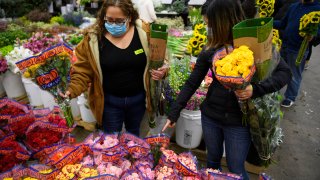
- Farmers cut back on berry and flower production in anticipation of a slow season, ultimately causing shortages in both.
- 1-800-Flowers will be able to meet demand for flowers this season due to long-standing relationships with suppliers and anticipates a successful holiday season.
- The company raised its guidance for the fourth quarter and next fiscal year after seeing a growth in customer base.
1-800-Flowers CEO Chris McCann said Thursday the company can ride out global shortages in flowers and berries.
"Farms not knowing how to plan for this year, cut back and it is causing a bit of contention," McCann told CNBC's "Squawk Box." "That, coupled with some weather conditions, has caused the challenge that we see in the floral industry today."
Get Boston local news, weather forecasts, lifestyle and entertainment stories to your inbox. Sign up for NBC Boston’s newsletters.
After low demand for flowers and berries this time last year, farmers cut back on planting those crops leading to global shortages this year. Despite shortages, 1-800-Flowers is confident its local florists have enough supply to meet this year's Mother's Day demand.
"Fortunately because of the size and the scale that we have and the size of the relationships we have in the growing community, we are able to manage through this and, in fact, help many of our local florists to get the supplies they need to give us the anticipation of a very successful Mother's Day holiday this year, McCann said.
It's the same for its berry supply. "We're ahead of the curve there and we don't see that impacting our Mother's Day holiday either," McCann said.
Money Report
At the beginning of the pandemic, demand for fresh berries fell largely due to restaurant closures, so suppliers cut back on berry production in anticipation of low demand this year. Then, demand for berries surged when Americans were stuck at home, creating a shortage.
Soren Bjorn, president of the Americas division of Driscoll, the world's largest berry company, told suppliers to increase their strawberry acres this fall, but those berries will not be available till next spring, according to the Wall Street Journal.
But shares of 1-800-Flowers were down about 6% on Thursday. Its stock has gained nearly 23% this year, putting its market value at more than $2 billion.
The flower giant said it was able to expand its customer base during the pandemic as more people shopped for gifts online and it anticipates continued growth for next year. 1-800-Flowers reported an unexpected profit last week, and raised its fourth-quarter forecast.
"We've had this great growth momentum going into the pandemic, accelerated by the pandemic, it's put us at a new level," McCann said. "Our ability to manage this gave us the confidence to guide for Q4, which we are in now, a double-digit growth rate of 10-15%, on top of the 61% we grew last year."
The company also anticipates large growth for the next fiscal year, beginning at the end of this quarter.
"We even guided double-digit growth last week for the next fiscal year," McCann said. "Based on what we see this quarter, based on what we see the supply-chain challenge we have and based on what we see consumer confidence going forward. We think we're just taking the business to a new level to grow from here."
One factor in its improved performance has been a turnaround at its Sheri's Berries business since it was acquired in 2019.
"We bought Sheri's Berries about 18 months or so ago and it's been a roaring success for us," said McCann. "We took a company that was stagnant in growth, not making any money, we have it now growing nicely double digits."






